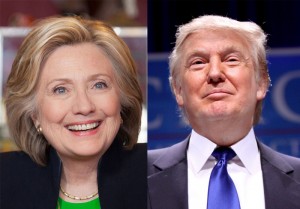
Billionaire real estate mogul Donald Trump is now the presumptive Republican nominee for the U.S. presidency, but early indications are he faces a daunting contest against the likely Democratic candidate, former secretary of state Hillary Clinton.
Numerous national election surveys show Clinton, seeking to become the country’s first female president, defeating Trump, who surged to the top of a large field of Republican candidates with tough talk to halt illegal immigration into the country from Mexico and temporarily block Muslims from entering the country. His rise has prompted his closest Republican rivals to drop out of the race.
Collectively, the polling gives Clinton, the country’s top diplomat from 2009 to 2013, about a six-percentage point edge over Trump, a one-time television reality show host who has never held elective office. A newCNN/ORC poll Wednesday showed a bigger Clinton margin, 54 to 41 percent.
The CNN poll also showed voters prefer Clinton, the wife of former president Bill Clinton, over Trump on how each would deal with a range of issues, including terrorism, foreign policy, immigration, health care and education.
U.S. political analysts say the last quarter century of presidential elections also would seem to favor Clinton. One map showed this week that to win the presidency, she would need only to capture 20 of the country’s 50 states in November’s national election against Trump, the 19 that have voted for Democratic candidates in the past six presidential elections, plus the large southeastern political battleground state of Florida, where one poll shows her ahead of Trump by 13 percentage points.
State-by-state voting plays the dominant role in U.S. presidential elections. The quadrennial contests for a four-year term as the American leader are not decided by a national popular vote, but by the outcome of individual contests between the Republican and Democratic nominees in each state, with each state’s number of electoral votes based on its population and the number of senators and members of Congress.[xyz-ihs snippet=”adsense-body-ad”]
As he became the party’s presumptive presidential nominee Tuesday, after a resounding primary victory over his remaining challengers in the Midwestern state of Indiana, Trump showed no concern that the odds-of-the-moment might be stacked against him.
“We’re going to win in November,” he declared at a victory rally at his signature skyscraper building in New York. “We want to bring unity to the Republican Party. We have to bring unity.”
Establishment Republicans
Some establishment Republicans have continued to voice their opposition to Trump becoming the standard bearer for the party in the election to pick the successor to President Barack Obama, who leaves office in January. Some fear he has little chance of defeating Clinton, while others continue to protest that he does not hold some of the conservative values on which U.S. Republicans traditionally campaign.
After Trump routed his chief remaining competitor in Indiana, Texas Senator Ted Cruz, one conservative stalwart, Erick Erickson, said, “I don’t want to congratulate Hillary Clinton in winning the presidency tonight, but she just did.”
After his defeat, Cruz dropped out of the presidential race and the party’s national chairman, Reince Priebus, described Trump as the presumptive nominee..
Clinton eyes Trump
Clinton is aiming her verbal attacks at Trump, but she also has yet to clinch the Democratic nomination.
She lost her party’s Indiana primary to her lone rival, Vermont Senator Bernie Sanders. He is a self-described democratic socialist who has attacked Clinton for her ties to Wall Street financial chieftains and her vote as a senator more than a decade ago to approve the U.S. military invasion of Iraq to topple dictator Saddam Hussein.
After winning in Indiana, Sanders has won 18 state contests against Clinton. He told supporters Tuesday that he has a “narrow path to victory” over Clinton for the Democratic nomination, but noted that national election surveys show him defeating Trump more handily than Clinton does.
In Indiana, as elsewhere, he continued to win by wide margins among voters 29 years old and younger.
Sanders’s campaign manager, Jeff Weaver, told CNN, “The pundits want to say (the Clinton-Sanders race) is over, but the voters have a different view.”
Source: VOA [xyz-ihs snippet=”Adversal-468×60″]
